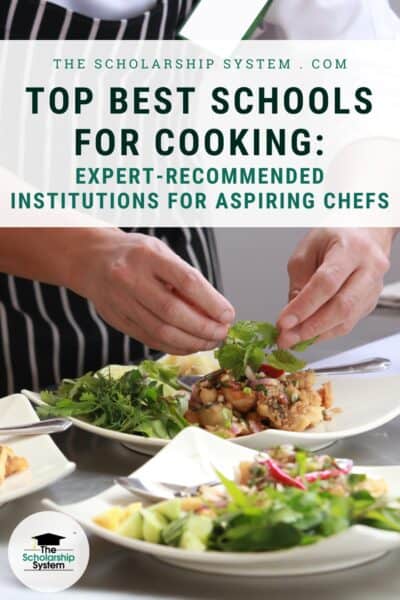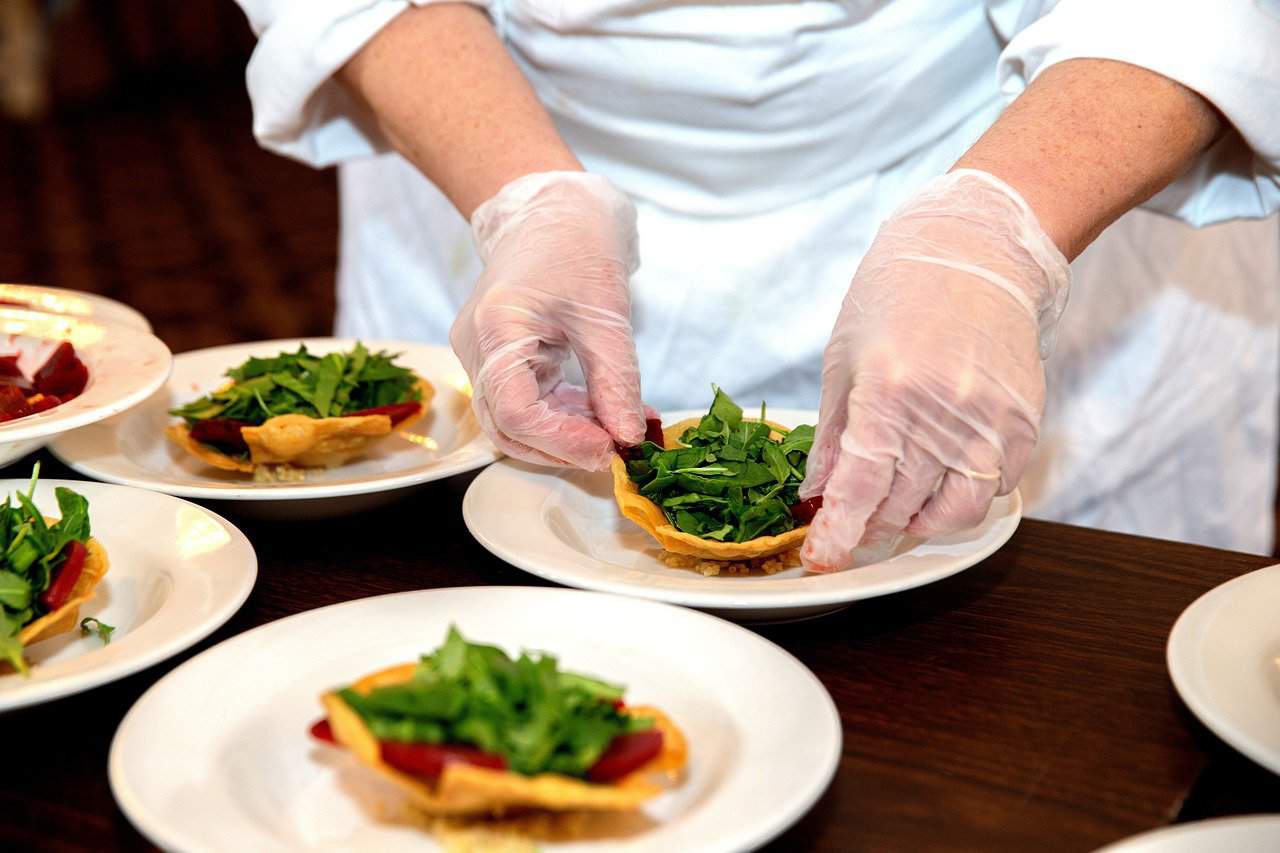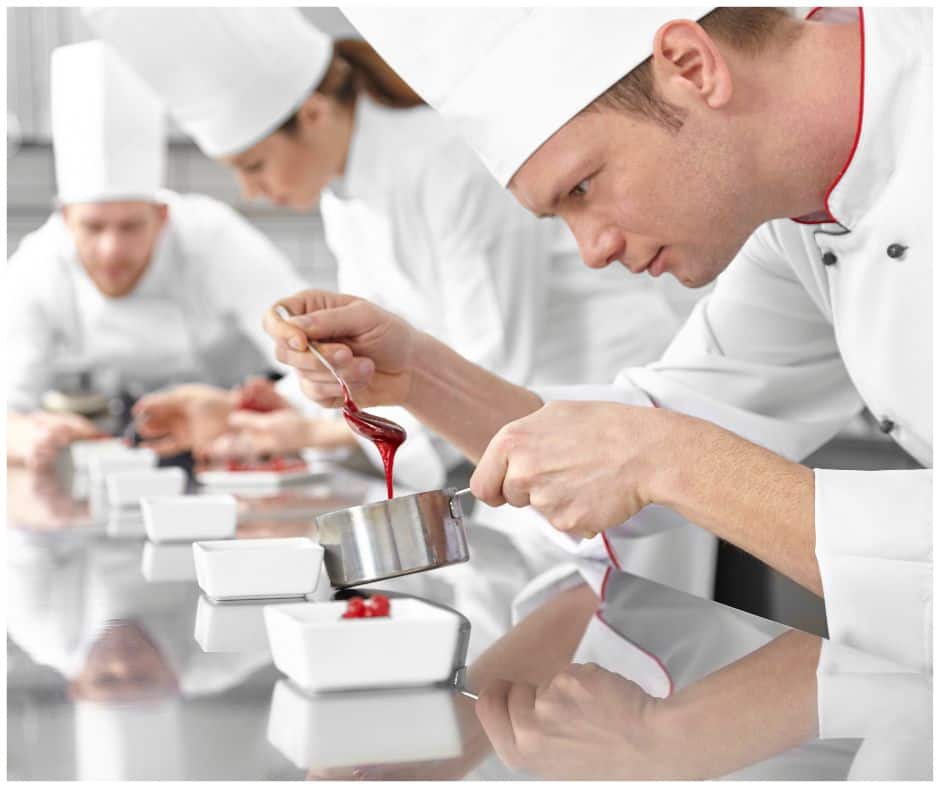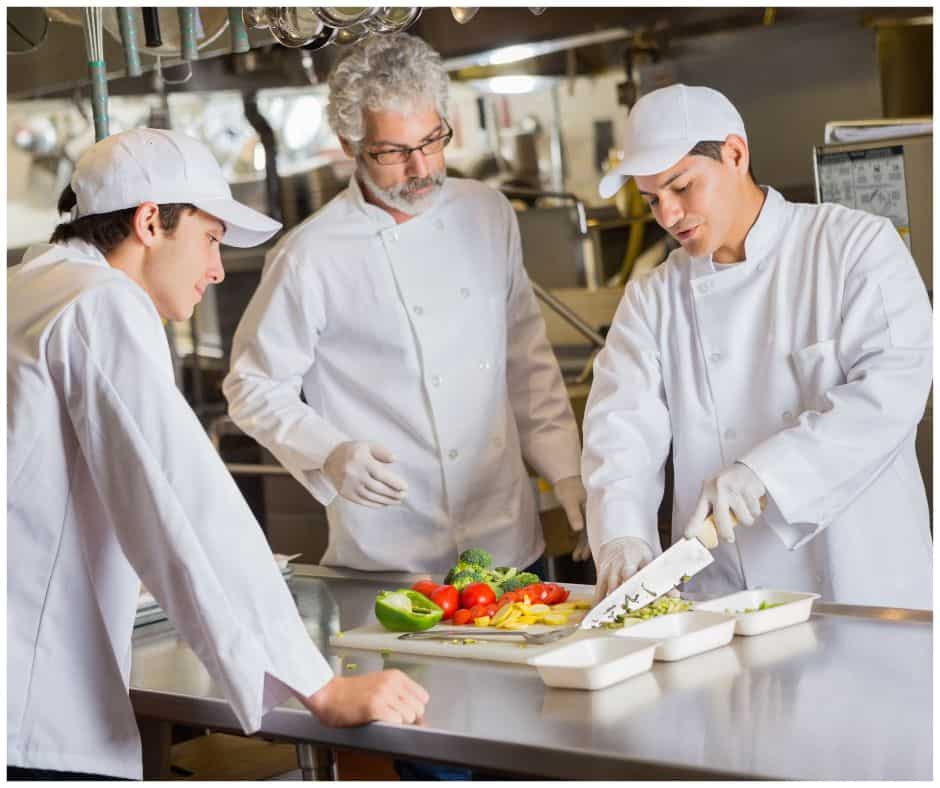Updated on October 18th, 2024
For students with a passion for food and creativity, the journey to becoming a professional chef starts with the right education. It’s not just about learning recipes; it’s about mastering the techniques and discipline needed to thrive in a fast-paced kitchen environment. The right school can transform a student’s natural talent into a lifelong career filled with culinary innovation and achievement.
If your student wants more financial aid to cover the cost of their culinary education, it’s easier than you’d think. Sign up for our free college scholarship webinar to learn more about the process! Take a quick trip over to http://thescholarshipsystem.com/freewebinar to reserve a spot today.
Finding the best schools for cooking is crucial for students eager to dive into the world of culinary arts. These institutions provide hands-on experience, mentorship from seasoned professionals, and opportunities to explore different cuisines and cooking styles. Whether your student dreams of working in a Michelin-starred restaurant or starting their own venture, choosing the right culinary school will set them on the path to success.
What Are Culinary Schools?
Culinary schools are specialized institutions that offer professional culinary education tailored to the skills and knowledge required in the food and hospitality industries. Students can explore various areas of the culinary world, from developing new recipes to mastering intricate food presentation techniques.
These schools often provide hands-on training in kitchens, helping students refine their abilities and gain practical experience. With programs ranging from basic cooking techniques to advanced gastronomy, culinary schools offer students the resources needed to build a solid career foundation.
Depending on the school and program, students can pursue various qualifications, including certificates, associate degrees, or culinary degrees. These programs are designed to equip students with a range of competencies, from basic cooking principles to food safety and management skills. Whether aiming for a role as a chef, pastry artist, or hospitality manager, culinary schools offer specialized courses that allow students to focus on specific areas of interest.
Additionally, culinary schools emphasize the importance of real-world experience. Many institutions partner with hotels, restaurants, and catering businesses to provide internships or externships. These opportunities allow students to gain invaluable industry insights and connections, helping them transition smoothly into the food industry after graduation.
Types of Culinary Arts Degrees
Various culinary arts major options are available for students seeking formal qualifications in this field. The most common pathways include associate’s degrees and bachelor’s degrees, both of which offer unique benefits depending on a student’s career goals.
An associate’s degree, typically a two-year program, is an excellent starting point for students eager to begin working in the food industry. This degree covers essential culinary techniques and offers a broad introduction to kitchen operations, food preparation, and safety standards.
A bachelor’s degree may be the best option for students looking to advance into management roles or specialize in more intricate culinary techniques. This degree program often delves deeper into business management, culinary innovation, and even global cuisine. With a four-year bachelor’s program, students not only learn advanced cooking techniques but also develop leadership and organizational skills necessary for running a kitchen or managing a hospitality business.
Many culinary schools also allow students to apply credits from an associate degree toward a bachelor’s program, providing flexibility for students who wish to further their culinary education. This creates a pathway for those who may start with a foundational program and later pursue advanced skills or management opportunities.
Culinary Arts Programs
Culinary arts programs are designed to prepare students for successful careers in the culinary arts major by combining hands-on experience with academic knowledge. These programs often cover a wide range of topics, including food preparation, kitchen management, nutrition, and even sustainable practices in the culinary world. Students learn essential techniques to excel in professional kitchens, as well as the business aspects of running a restaurant or food service operation.
In addition to traditional culinary skills, many culinary degree programs incorporate lessons in hospitality, service management, and marketing, helping students develop a holistic understanding of the food industry. By integrating theory with practice, students gain a well-rounded education that prepares them to thrive in diverse culinary settings, from high-end restaurants to corporate catering. Plus, culinary arts institutions often emphasize leadership and entrepreneurship, nurturing students’ culinary talent and equipping them with the tools they need to succeed in the competitive food and hospitality sectors.
Top Culinary Schools in the US
Several renowned culinary schools in the US offer excellent degree programs that provide students with both hands-on experience and a solid academic foundation. Johnson & Wales University, known for its Bachelor of Science in Culinary Arts, also offers specialized programs in Baking & Pastry Arts. This school combines practical kitchen experience with classroom learning, giving students a well-rounded culinary education.
Another top institution is The Culinary Institute of America at Hyde Park, a private, not-for-profit school offering undergraduate culinary school degree programs in Culinary Arts and Hospitality Management. With its well-established reputation, the school provides students with advanced training in culinary techniques and management, preparing them for leadership roles in the food industry. The Culinary Institute of America is particularly known for its innovative curriculum and strong alumni network.
Nebraska Metropolitan Community College in Omaha, and Sullivan University’s National Center for Hospitality Studies also offer exceptional programs. Nebraska Metropolitan Community College is recognized as one of the best culinary programs in the country, emphasizing practical experience and low tuition costs, while Sullivan University provides students with both associate and bachelor’s degrees in hospitality management and culinary arts. With a favorable student-faculty ratio, these schools offer personalized attention, helping students refine their skills through direct mentorship and training.
Choosing the Right Culinary School
When selecting a culinary school, students should consider several factors to ensure they choose the best fit for their career aspirations. First, it’s essential to reflect on the type of culinary school degree a student wants to pursue, whether it’s an associate, bachelor’s, or certificate program.
Students should also consider how much hands-on experience they want, as many top culinary schools offer extensive practical training in professional kitchens. This training is invaluable for students entering the fast-paced food industry upon graduation.
The reputation of a culinary school plays a significant role in preparing students for a successful career. Schools with a strong track record of producing accomplished graduates and connections to the industry are ideal choices. Additionally, students should look into the student-faculty ratio, as a lower ratio often indicates more personalized instruction and mentoring, which can enhance the overall learning experience.
Finally, the college admissions process is another factor to keep in mind. Each culinary school may have different requirements, from portfolio submissions to interviews. Some schools may focus on prior experience in the food industry, while others may be more open to students with a passion for cooking and a desire to learn. Thoroughly researching each school’s process will help students find the best match for their goals and talents.
Accreditation and Certification
Accreditation is a critical consideration when choosing a culinary school, as it ensures that the program meets high quality standards and has industry relevance. Many top culinary schools in the US are accredited by the American Culinary Federation (ACF) or the Accrediting Commission of Career Schools and Colleges (ACCSC).
In addition to accreditation, certification is crucial for culinary arts graduates to demonstrate their expertise. Professional certification from organizations like the ACF can give students a competitive edge when entering the food industry, as they validate a student’s technical skills and knowledge, making them more attractive to potential employers.
Scholarships and Financial Aid for Culinary Students
Going to culinary school can be a big investment, but there are many scholarships and financial aid options to help fund your students education. These options can make culinary school more affordable.
One of the most well-known scholarships for culinary students is the JJames Beard Foundation Scholarship. This scholarship helps aspiring chefs and culinary professionals with their education. Another is the National Restaurant Association Educational Foundation (NRAEF), which has multiple scholarships for students pursuing degrees in culinary arts, hospitality, and restaurant management. And then there’s The Charlie Trotter Culinary Education Foundation. The Trotter Project has scholarships for undergraduate students in culinary arts, hospitality, or food science agriculture.
Beyond scholarships, many culinary schools also offer financial aid packages that include scholarships, loans, and work-study programs.
Career Opportunities for Culinary Arts Graduates
Graduating with a culinary arts degree opens doors to a variety of exciting career opportunities. Students can work in top kitchens, restaurants, and hotels, taking on roles as chefs, sous chefs, or food and beverage directors. For those with a passion for baking, careers in pastry arts are also an option, offering roles as pastry chefs in high-end bakeries and patisseries.
Some students choose to pursue entrepreneurial paths, launching their own food businesses or restaurants. The comprehensive training gained from the best culinary schools equips graduates with the skills needed to manage and operate their establishments successfully. Whether working in a professional kitchen or creating their own culinary ventures, culinary graduates are essentially spoiled for choice in the food industry.
Expert Insights and Recommendations
Industry experts consistently emphasize the importance of attending culinary colleges to gain hands-on experience and expertise. Culinary schools provide students with opportunities to learn from experienced chefs and instructors, giving them a solid foundation in both the technical and creative aspects of the culinary profession.
Additionally, choosing a school with a strong reputation in the industry is crucial. Many professional development programs offered by culinary schools provide advanced training and mentorship, ensuring students gain the real-world experience necessary for success.
The Benefits of Attending a Culinary School
Attending a culinary school offers students invaluable experience and practical training in culinary arts. Through hands-on classes and kitchen labs, students master essential cooking techniques, menu planning, and food presentation.
Plus, learning from seasoned chefs allows students to gain insights into the latest industry trends and kitchen innovations, ensuring they stay competitive in their field. Additionally, culinary colleges provide students with access to industry connections, internships, and job placement services.
Ultimately, networking with established chefs and restaurant owners opens doors to career opportunities after graduation. Many schools partner with top restaurants, enabling students to secure roles in respected establishments.
In the end, the combination of skills development, mentorship, and career support is what makes attending a culinary school an excellent investment for aspiring chefs.
Online and Continuing Education Options
For students looking to balance their studies with other responsibilities, many of the best culinary schools now offer online programs and continuing education options. These programs provide the flexibility to learn at one’s own pace, allowing students to develop their skills without the constraints of a traditional classroom schedule. This is particularly helpful for those who may already be working in the food service industry and want to further their education or enhance their culinary expertise while maintaining their current commitments.
These degree programs often include interactive coursework, virtual kitchen labs, and video tutorials that mirror the hands-on experience offered in on-campus settings. Whether students pursue a full undergraduate degree or additional certifications, online and continuing education options allow them to stay competitive in the fast-evolving culinary world and advance their careers while maintaining the flexibility needed for their personal and professional lives.
Specialized Culinary Arts Programs
For students with specific career aspirations, many culinary schools offer specialized bachelor’s degree programs to provide advanced training in niche areas of the culinary arts. These programs may focus on specialties such as pastry arts, culinary science, or hospitality management, allowing students to develop expertise that aligns with their personal interests and career goals.
Specialized culinary program options offer a deeper dive into specific aspects of the food industry, preparing students for roles that require advanced knowledge and technique. From crafting artisan pastries to mastering molecular gastronomy, these programs equip students with the expertise to excel in their chosen path.
The Importance of Culinary Arts Education
A solid culinary arts education is essential for students aiming to succeed in the competitive culinary field. Culinary schools provide the comprehensive training needed to develop both technical skills and creativity in the kitchen. Through a well-rounded curriculum, students learn everything from food preparation to kitchen management, ensuring they are well-equipped to handle the demands of the food service industry.
Plus, the best culinary schools go beyond teaching cooking techniques by offering hands-on experience, mentorship from seasoned professionals, and access to networking opportunities. These schools provide students with the foundation to build a successful culinary career, whether they plan to work in restaurants, hotels, or other culinary ventures.
Conclusion
Attending a culinary school is an essential step to build a successful career in the culinary world. With the right culinary program, students gain a combination of practical training, academic knowledge, and mentorship from experienced professionals.
Students should seek out accredited schools that offer robust degree programs and align with their specific career goals, ensuring they get the most out of their education. By choosing one of the best culinary schools, students can gain the skills, knowledge, and connections necessary to thrive in the food service industry, opening the door to an exciting culinary career.
If your student wants more financial aid to cover the cost of their culinary education, it’s easier than you’d think. Sign up for our free college scholarship webinar to learn more about the process! Take a quick trip over to http://thescholarshipsystem.com/freewebinar to reserve a spot today.









Leave a Reply